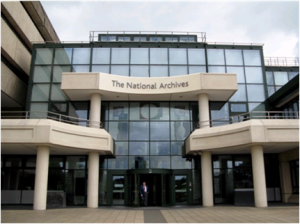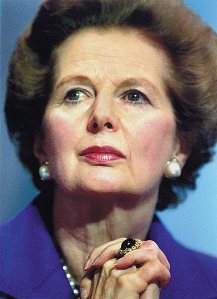The latest round of declassified files from The National Archives (TNA) at Kew, south-west London, released last Friday (30th December), offer some further fascinating insights into Margaret Thatcher’s time as Prime Minister (PM) in the 1980s. The files, which mainly cover the period 1989-90, throw new light on the twilight years of her premiership, including her foreign policy outlook.
In particular, the files appear to confirm the longstanding suspicion of a number of historians (which I happen to share) that Mrs. Thatcher held some notably negative, and arguably xenophobic, personal stereotypes about ‘foreigners’, especially the Germans and the German ‘character’, prejudices that inevitably impacted on her public policy towards Europe and German reunification in 1989-90.
 I think it is no exaggeration to say that Mrs. Thatcher was always deeply interested in history and, as a young schoolgirl, she had read and enjoyed the pro-Empire works of writers such as Rudyard Kipling. According to her biographers, she was also especially impressed with Robert Bruce-Lockhart’s book Guns or Butter (1938), a strong critique of appeasement, and also a book that she apparently borrowed a number of times from her local library in Grantham.
I think it is no exaggeration to say that Mrs. Thatcher was always deeply interested in history and, as a young schoolgirl, she had read and enjoyed the pro-Empire works of writers such as Rudyard Kipling. According to her biographers, she was also especially impressed with Robert Bruce-Lockhart’s book Guns or Butter (1938), a strong critique of appeasement, and also a book that she apparently borrowed a number of times from her local library in Grantham.
Unsurprisingly, one of her great heroes was also Sir Winston Churchill. Later in her own political career, perhaps to reinforce her reputation as a Churchillian-style ‘conviction’ politician, and via a highly selective reading of the past, it was quite striking how Mrs. Thatcher regularly referenced the great events of British and European history (most notably the Second World War) in her speeches and political rhetoric. Much of this involved proclaiming how Britain’s destiny lay in being ‘great’ again, or how important it was that the UK should never ‘appease’ dictators (whether Russian Communist, Argentinian, or even the ‘enemy within’ i.e. trade union ‘barons’). And, as with a number of other PMs in the British past, it would appear that Thatcher liked to have her private prejudices confirmed by her own favourite ‘inner circle’ of advisors and experts, including a number of historians.
 Significantly, in July, 1990, a government Memo was leaked to the British newspaper The Independent on Sunday about a (now quite notorious) confidential meeting that Mrs. Thatcher and her Foreign Secretary Douglas Hurd had quietly convened at Chequers, the PM’s official country house. Held in March that year, the secret seminar had been on the subject of Germany and the pros and cons of German reunification, and whether certain features of the German ‘character’ had changed or remained the same. The leaking of the Memo and its contents proved highly embarrassing for the government, as this was just days after Nicholas Ridley, a close Cabinet colleague of the PM, had given a very controversial interview to the Spectator where he had suggested that the proposed European Monetary Union (EMU) had become ‘a German racket designed to take over the whole of Europe’, and made a number of other dubious claims about the Germans, ideas which appeared to echo Thatcher’s own views.
Significantly, in July, 1990, a government Memo was leaked to the British newspaper The Independent on Sunday about a (now quite notorious) confidential meeting that Mrs. Thatcher and her Foreign Secretary Douglas Hurd had quietly convened at Chequers, the PM’s official country house. Held in March that year, the secret seminar had been on the subject of Germany and the pros and cons of German reunification, and whether certain features of the German ‘character’ had changed or remained the same. The leaking of the Memo and its contents proved highly embarrassing for the government, as this was just days after Nicholas Ridley, a close Cabinet colleague of the PM, had given a very controversial interview to the Spectator where he had suggested that the proposed European Monetary Union (EMU) had become ‘a German racket designed to take over the whole of Europe’, and made a number of other dubious claims about the Germans, ideas which appeared to echo Thatcher’s own views.
The new TNA files now available include a file which contains the full text and some further details on the controversial 1990 ‘Memo’ episode. As I have made use of this incident in my own teaching, I was especially keen to find out more. Six ‘independent experts’ were invited to attend the PM’s residence to give their views on Germany and the German ‘character’. The group included the historians Hugh Trevor-Roper (Lord Dacre) and Prof. Norman Stone, journalist and historian Timothy Garton Ash, George Urban (formerly director of research at Radio Free Europe), and two historians from two top U.S. Universities – Prof. Fritz Stern of Columbia and Gordon Craig from Harvard.
The Memo, drawn up by Charles Powell, the PM’s Private Secretary, said that the government needed to reach an assessment ‘of what a united Germany would be like…’. Not all the historians agreed with one another, and various assessments of Germany’s past and future were voiced. However, what was also clear from the day’s discussions is that a series of quite negative observations were made about the German people, including claims that Germans were aggressive, assertive, insensitive, self-pitying and egotistical. Although this was a summary of the discussions written up by Powell, who possibly added his own flavour to the summary, one can imagine that some of this was music to the ears of Thatcher, who had her own very strong views about Germany’s past history.
Indeed, what the newly-released files also reveal more generally is how uncomfortable the Prime Minister was about the whole idea of German reunification, and how she feared that a reunited Germany could possibly become a big problem again in the future. It would appear that she could not break free from her conviction that the Germans had been a ‘problem’ in the past and could easily resort to their old ‘habits’. Moreover, after the fall of the Berlin Wall in November, 1989, she had to be cajoled by her special advisors into issuing a statement of congratulations to the Germans. Similarly, in October, 1990, on the eve of the formal reunification of Germany, Thatcher had to be cajoled once again into making some positive statements about the new country.
More shockingly, the files reveal that – at Mrs. Thatcher’s behest – her Private Secretary Charles Powell (the author of the Chequers Memo) had already sabotaged a special reunification ceremony that had been carefully planned by Helmut Kohl, the German Chancellor, for October 3rd, 1990. Powell had rung the American White House to persuade the U.S. President, Bush Sr, not to attend. In fact, Thatcher’s apparent hostility towards the Germans caused some puzzlement and alarm among the Americans, who were clearly taken aback by what they regarded as the British PM’s somewhat insular and backward-looking notions.
One suspects that the recent decision for ‘Brexit’ shows that such attitudes have continued to play a role in British political culture.
Steve Woodbridge is Lecturer in History at Kingston University
(Photos: WikiMedia Commons)

